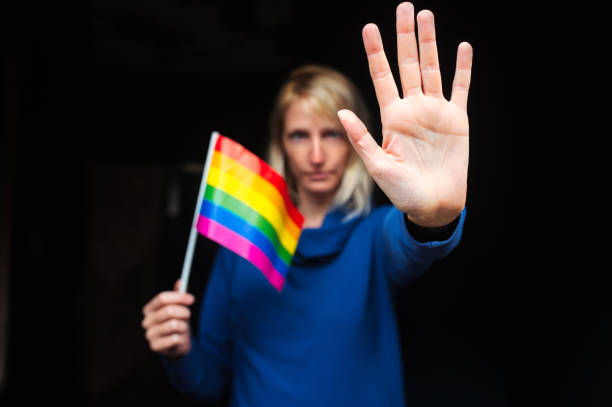Imagine this: you were born amazing, just the way you are. But along the way, you hear whispers, see messages, or experience situations that make you feel like something about you might be wrong. This feeling, for many lesbian, gay, bisexual, transgender, and queer (LGBTQ+) individuals, is called internalized homophobia.
This comprehensive guide delves into internalized homophobia, a pervasive issue within the LGBTQ+ community. We’ll explore its definition, manifestations, root causes, and the profound impact it has on mental health, relationships, and personal growth. More importantly, we’ll equip you with powerful strategies to dismantle these negative beliefs and a guide to overcoming shame and self-hatred.
What is Internalized Homophobia?
Internalized homophobia is like a voice in your head that echoes negative messages about LGBTQ+ people. It’s when you start to believe those messages and feel bad about yourself because of your sexual orientation or gender identity.
Internalized homophobia refers to the involuntary absorption of societal negativity towards LGBTQ+ identities. This ingrained self-hatred stems from homophobic messages encountered through media, religion, politics, and cultural norms. These messages often:
How Does It Show Up?
This negativity can creep in many ways, like:
The internalization of these messages leads to a multitude of negative consequences, including:
Negative Self-Perception: Feeling unworthy or inferior due to sexual orientation.
Shame and Guilt: Experiencing chronic shame and guilt about being LGBTQ+.
Denial and Suppression: Denying or hiding one’s true self to avoid stigma.
Compensatory Behaviors: Exaggerating traditionally masculine or feminine traits to fit societal expectations.
Disapproval of Others: Distancing oneself from the LGBTQ+ community due to internalized negativity.
Mental Health Issues: Increased risk of depression, anxiety, and low self-esteem.
Why Does It Happen?
These negative feelings often come from the world around us. Sometimes it’s media messages, jokes you hear, or even comments from family or friends. These messages can make you feel like being LGBTQ+ is wrong, even if you know deep down it’s not true.
Strategies for Overcoming Internalized Homophobia
The path to self-acceptance is empowering, and here are some key strategies to guide you:
Self-Awareness and Acceptance: The first step is acknowledging these internalized beliefs. Engage in self-reflection, journaling, and mindfulness practices to identify negative thought patterns.
Education and Information: Educate yourself about LGBTQ+ history, rights, and achievements to counter negative societal messages. Explore LGBTQ+ literature, documentaries, workshops, and seminars.
Seek Professional Help: Therapy can be a powerful tool. Consider Cognitive-Behavioral Therapy (CBT) to challenge negative thoughts, Acceptance and Commitment Therapy (ACT) to accept difficult emotions, or seek an LGBTQ+-affirmative therapist who provides a supportive environment.
Build a Support Network: Surround yourself with supportive people. Join LGBTQ+ groups, connect with allies, and participate in community events to foster a sense of belonging.
Challenge Negative Beliefs: Actively challenge negative self-talk. Practice cognitive restructuring by replacing negative thoughts with positive affirmations, reality testing to assess the validity of negative beliefs, and positive self-talk to cultivate self-compassion.
Embrace Your Identity: Celebrate your LGBTQ+ identity! Explore activities and communities that resonate with you, express yourself authentically, and acknowledge milestones in your self-acceptance journey.
Empowerment Through Advocacy and Activism
Getting involved in LGBTQ+ advocacy and activism can be both personally empowering and helpful to others. Consider volunteering for LGBTQ+ organizations, raising awareness on social media, or supporting legislation that protects LGBTQ+ rights.
Long-Term Maintenance: Cultivating Resilience and Self-Care
Overcoming internalized homophobia is an ongoing process. Here’s how to maintain progress:
Continuous Learning: Stay informed about LGBTQ+ issues and advancements. Invest in personal development activities that boost self-esteem and resilience. Regularly seek feedback from trusted individuals to stay grounded.
Self-Care Practices: Prioritize mental and emotional well-being. Engage in activities like exercise, healthy eating, meditation, hobbies, and emotional processing to manage stress and promote relaxation.
Building Resilience: Develop healthy coping mechanisms for dealing with challenges. Cultivate optimism, focus on solutions, and strengthen your support network.
Remember:
The journey to self-acceptance is unique. Be patient with yourself, celebrate your progress, and know that you are worthy of love and belonging. You are not alone.
Overcoming internalized homophobia is an ongoing process. There will be good days and bad days. Be patient with yourself, celebrate your victories, and remember, you are worthy of love and happiness, just the way you are!



